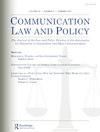“The Gloss of History”: A Historical Analysis of U.S. Supreme Court Justices’ Framing of First Amendment Press Rights to Cover and Access Court Proceedings
IF 0.2
Q4 LAW
引用次数: 0
Abstract
Abstract Originalism explores the intentions for, or understandings of, constitutional rights held by drafters of the Constitution or founders of the United States. This qualitative historical analysis evaluates the accuracy and adequacy of U.S. Supreme Court justices’ citations of founders’ intentions for, or understandings of, free press rights in opinions addressing journalists’ rights to cover and access court proceedings. Our research found that justices some times have accurately and adequately cited founders’ writings. Yet, justices too often have cited court opinions and other documents from the 1800s or 1900s to support their assertions about original intentions for or understandings of freedom of speech or of the press and First Amendment values. When referencing writings by founders, justices sometimes provided inadequate context. Such practices have harmed the accuracy of legal and historical records. To improve accuracy in future opinions, justices need to stop citing sections of previous opinions that lack accurate citation, adequate citation, or proper context.“历史的光泽”:美国最高法院法官对第一修正案新闻报道和进入法院诉讼的权利框架的历史分析
抽象原旨主义探讨的是美国宪法起草者或开国元勋对宪法权利的意图或理解。这一定性历史分析评估了美国最高法院法官在涉及记者报道和参与法庭诉讼的权利的意见中引用创始人意图或对新闻自由权的理解的准确性和充分性。我们的研究发现,大法官有时会准确而充分地引用创始人的著作。然而,法官们经常引用19世纪或20世纪的法院意见和其他文件来支持他们对言论自由或新闻自由的初衷或理解以及第一修正案价值观的主张。在引用创始人的著作时,法官有时会提供不充分的背景。这种做法损害了法律和历史记录的准确性。为了提高未来意见书的准确性,法官们需要停止引用以前意见书中缺乏准确引用、充分引用或适当背景的部分。
本文章由计算机程序翻译,如有差异,请以英文原文为准。
求助全文
约1分钟内获得全文
求助全文
来源期刊
CiteScore
0.60
自引率
33.30%
发文量
7
期刊介绍:
The societal, cultural, economic and political dimensions of communication, including the freedoms of speech and press, are undergoing dramatic global changes. The convergence of the mass media, telecommunications, and computers has raised important questions reflected in analyses of modern communication law, policy, and regulation. Serving as a forum for discussions of these continuing and emerging questions, Communication Law and Policy considers traditional and contemporary problems of freedom of expression and dissemination, including theoretical, conceptual and methodological issues inherent in the special conditions presented by new media and information technologies.

 求助内容:
求助内容: 应助结果提醒方式:
应助结果提醒方式:


